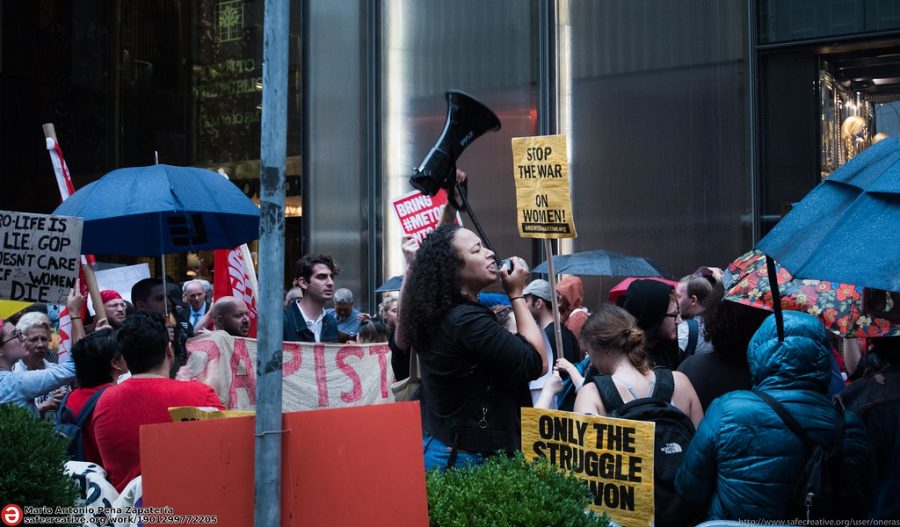Column: We must listen to all victims of sexual assault
“#metoo” by Mario A. P. is licensed under CC BY-SA 2.0
Concerns about false sexual assault allegations should not silence everyone’s story.
March 31, 2021
Content warning: discussion of sexual assault
Editor’s note: The Huntington News wants students to know Northeastern University and elsewhere provide sexual assault resources for students.
- WeCare: wecare@northeastern.edu, 617-373-7591, 226 Curry
- University Health and Counseling Services (UHCS): uhcs@northeastern.edu, 617-373-2772, Forsyth Building, 1st Floor
- 24/7 Mental Health Support: for students by phone (FIND@Northeastern) – 877-233-9477 (U.S.), 781-457-7777 (international)
- Suicide Prevention Hotline: 1-800-273-8255
- Sexual Assault Prevention and Survivor Services (SAPSS)
Another semester, another round of mandatory sexual harassment and assault training. It’s something that may seem redundant and a waste of time, but it’s a far cry from this. Everyone’s story counts.
In honor of Women’s History Month, I’m going to take a trip down memory lane. The #MeToo movement brought recognition to voices that would’ve otherwise gone unheard. The movement became increasingly popular when allegations against movie producer Harvey Weinstein surfaced in 2017. Prior to the rise of this movement, many feared speaking up against Weinstein, so allegations made prior to 2017 never really went anywhere. In the wake of #MeToo, Weinstein was sent to jail. This instance is just one of the many successes of the movement.
Despite all of the victories of the #MeToo movement, some people were still left unheard. Dylan Farrow, adopted daughter of Mia Farrow and Woody Allen, was sexually assaulted by Allen at a young age. Allen was never criminally prosecuted, and when the topic reemerged years later the #Me Too movement didn’t even entertain it. As a result, Farrow was left feeling unheard and her horrific experience went uncondemned. It’s shocking that a movement that prides itself on listening to and amplifying women’s voices and stories failed to provide such a platform to Farrow. In this particular example, the movement failed.
Since the #MeToo movement has grown over the past few years, women felt heard while others began to care more about the prevalence of sexual assault throughout the world. However, backlash against the movement has come in the form of concerns regarding false allegations. If it turns out that someone lied, the credibility of allegations that are true, which far outnumber false allegations, come into question. People can lie about anything in life. The majority tells the truth, but there’s always a slim minority that doesn’t. Unfortunately, this small number of people manage to cast doubt on any story of sexual assault as many people don’t have proof — just their story.
However, the number of people who don’t share their true stories is greater than the number of those who falsely report such experiences. A 2010 study reveals that the number of falsified sexual assault/rape stories is around 2-10%, and these rarely lead to charges being pressed on the alleged “assaulter.” As such, people should ultimately listen to everyone’s experience of sexual assault and believe them until proven otherwise, as a small minority lie while the vast majority tells the truth.
We all must listen when people come forward with stories about being sexually mistreated. If you were sexually abused, wouldn’t you want someone to listen to you and offer support? Or would you want to speak out and have no one there to hear your story? If you were one of the seven people who reported sexual misconduct in 2016-2017 at Northeastern, wouldn’t you want to be believed?
It’s imperative to note that sexual assault isn’t just something that a man does to a woman. Men are also victims, which I believe the #MeToo movement fails to adequately accommodate. The movement was founded to specifically address women’s experiences. It’s extremely important that women get a platform to express their stories, but men need one too. Maybe it’s time to include them in this movement because regardless of your gender, wouldn’t you want someone to listen if you were ready to share such a vulnerable story?
Every victim deserves to be heard. When a victim decides to tell their story, it’s never easy. Sometimes it takes a long time to tell their story and seek justice for what happened to them. Sometimes victims never end up speaking out. But the victims who do shouldn’t automatically be turned away, their stories deemed false narratives. We owe it to these courageous people to believe them.
Madison Boudreau Popovic is a first-year political science and business administration combined major. She can be reached at popovic.m@northeastern.edu.







